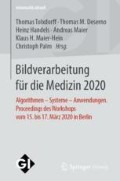Zusammenfassung
Segmentation of bacteria in live cell microscopy image sequences is a crucial task to gain insights into molecular processes. A main challenge is that some bacteria strongly change their appearance during the life cycle as response to fluctuations in environmental conditions. We present a novel deep learning method with shape-based weighting of the loss function to accurately segment bacteria during different stages of the life cycle. We evaluate the performance of the method for live cell microscopy images of Bacillus subtilis bacteria with strong changes during the life cycle.
Access this chapter
Tax calculation will be finalised at checkout
Purchases are for personal use only
Preview
Unable to display preview. Download preview PDF.
Literatur
Battenberg E, Bischofs-Pfeifer I. A system for automatic cell segmentation of bacterial microscopy images. Arkin Laboratory for Dynamical Genomics, Lawrence Berkeley National Laboratory; 2006.
Chowdhury S, Kandhavelu M, Yli-Harja O, et al. Cell segmentation by multiresolution analysis and maximum likelihood estimation (MAMLE). BMC Bioinformatics. 2013 Aug;14(10):S8.
Liluashvili V, Bergeest JP, Harder N, et al. Automatic single-Cell segmentation and tracking of bacterial cells in fluorescence microscopy images. In: BVM; 2015. p. 239–244.
Stylianidou S, Brennan C, Nissen SB, et al. SuperSegger: robust image segmentation, analysis and lineage tracking of bacterial cells. Mol Microbiol. 2016 Aug;102(4):690–700.
Sadanandan SK, Baltekin, Magnusson KEG, et al. Segmentation and trackanalysis in time-lapse imaging of bacteria. IEEE J Sel Top Signal Process. 2016 Feb;10(1):174–184.
Ronneberger O, Fischer P, Brox T. U-Net: convolutional networks for biomedical image segmentation. In: MICCAI; 2015. p. 234–241.
Hernandez CX, Sultan MM, Pande VS. Using deep learning for segmentation and counting within microscopy data. arXiv. 2018;/1802.10548.
Arbelle A, Raviv TR. Microscopy cell segmentation via convolutional LSTM networks. In: IEEE 16th ISBI; 2019. p. 1008–1012.
Hay EA, Parthasarathy R. Performance of convolutional neural networks for identification of bacteria in 3D microscopy datasets. PLOS Comput Biol. 2018 12;14(12):1–17.
He K, Zhang X, Ren S, et al. Deep residual learning for image recognition. In: IEEE CVPR; 2016. p. 770–778.
Author information
Authors and Affiliations
Corresponding author
Editor information
Editors and Affiliations
Rights and permissions
Copyright information
© 2020 Springer Fachmedien Wiesbaden GmbH, ein Teil von Springer Nature
About this paper
Cite this paper
Spilger, R., Schwackenhofer, T., Kaspar, C., Bischofs, I., Rohr, K. (2020). Deep Segmentation of Bacteria at Different Stages of the Life Cycle. In: Tolxdorff, T., Deserno, T., Handels, H., Maier, A., Maier-Hein, K., Palm, C. (eds) Bildverarbeitung für die Medizin 2020. Informatik aktuell. Springer Vieweg, Wiesbaden. https://doi.org/10.1007/978-3-658-29267-6_2
Download citation
DOI: https://doi.org/10.1007/978-3-658-29267-6_2
Published:
Publisher Name: Springer Vieweg, Wiesbaden
Print ISBN: 978-3-658-29266-9
Online ISBN: 978-3-658-29267-6
eBook Packages: Computer Science and Engineering (German Language)

